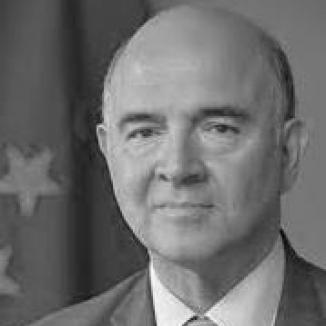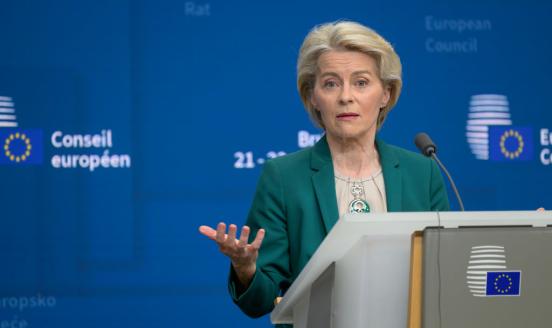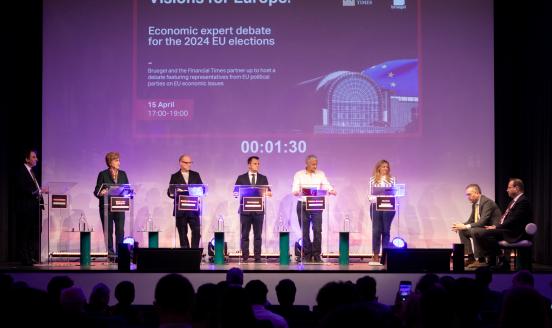Reforming decision-making for EU taxation policy
How should the EU taxation policy be reformed?
Speakers
Pierre Moscovici
European Commissioner for Economic and Financial Affairs, Taxation and Customs,
Johannes Becker
Professor and Director of Institute of Public Economics, University of Muenster,
Paola Profeta
Associate Professor, Department of Social and Political Sciences, Bocconi University,
Video and audio recording
Event materials
European Commissioner Pierre Moscovici was at Bruegel to discuss the European Commission's proposal for a transition to qualified majority voting (QMV) in certain areas of shared EU taxation policy.
summary
This event, which was moderated by Dr. Guntram Wolff, involved a debate on whether or not the EU should move toward a Qualified Majority Voting (QMV) System in regards to EU taxation and away from the unanimity system that currently exists. The EU Commission recently published a paper on the subject, and the keynote address was given by Pierre Moscovici, the Commissioner for Economic and Financial Affairs, Taxation, and Customs.
To open his address, Moscovici began by asking the rhetorical question of why now is the time for change. He said that if the issue of QMV voting and taxation had been raised earlier, it would have been shut down for political reasons. Now is the opportune to bring this issue to debate, however, because of the nearing European Parliament elections.
Moscovici emphasized that QMV can be utilized without violating the principle of subsidiarity, claiming that the move to QMV will benefit EU countries in all sorts of ways. In order to support this claim, he provided four main problems with unanimity voting.
First, he explains that the principle of unanimity was something that was necessary for the 20th century, but not for today. He explains that it was necessary to appease fears of loss of sovereignty as the EU was in its infant form. Today, QMV is used for many issues, and Moscovici asks why should it not be used for taxation as well?
Second, he claims that the principle of unanimity no longer protects national sovereignty. Rather, it prevents the emergence of genuine European sovereignty in tax matters. It is more important for member states to fear the loss of sovereignty that results from the inability to collect public revenues than the harmonization of rates proposed by Brussels.
Third, Moscovici argues that unanimity costs EU states billions each year in lost revenues from taxation. There are many digital companies that are currently evading taxes under the current system.
Lastly, He states that unanimity is harmful because it weakens true democracy at the EU level. One of the big issues that the EU faces is that many individuals see it as an inefficient bureaucracy. The fact that “majorities” can’t see their ideas implemented contributes to the popularity of this viewpoint. If the EU moved to QMV, this situation would be avoided and more states would feel that their voice is heard.
After Moscovici’s speech concluded, Paola Profeta (Associate Professor, Department of Social and Political Sciences, Bocconi University and Joannes Becker (Professor and Director of Institute of Public Economics, University of Muenster) participated in a panel discussion. Dr. Profeta placed emphasis on the fact that there is room for improvement in European integration and a more coordinated tax-policy through the implementation of QMV voting is a good step to take in order to achieve this. She also highlighted the issues that can come about since EU states are not homogenous and heterogenous states have different preferences for taxation policies. Similarly, Dr. Becker explained that there are many difficulties when dealing with heterogeneous states. He states that the goal should definitely be a move away from unanimity, but if it cannot be achieved now, he advises that the EU focus on creating laws that make it more difficult for countries to compete with tax rates. This, he argues, would make unanimity less appealing to member states who want to use the system to diverge from Brussels’ recommendations.
In the Q&A section, there were questions raised regarding the sovereignty issue that many smaller EU economies (Ireland, for instance) will feel due to the fact that they tend to have different preferences for taxation than France and Germany. There were also audience concerns about over taxation of individuals, to which the panel responded by saying that these taxes would primarily be corporate and not income taxes.
Notes by Davis Cousar







